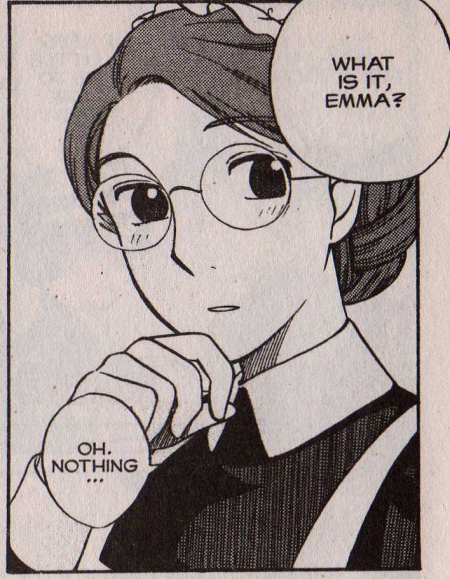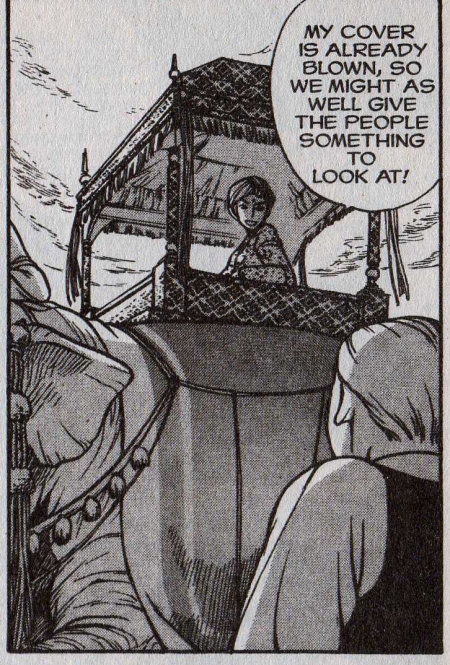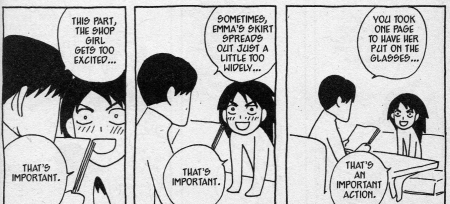Here’s my Flipped column on Kaoru Mori’s Emma, originally published at The Comics Reporter on April 3, 2008. It was written before the conclusion of the main narrative, so I’ll follow up later in the week with a proper review of the final volume, but I thought I’d pull it out for this second round of the Manga Moveable Feast. For a running roster of contributions, please visit Rocket Bomber.
Anyone who follows comic link aggregators has seen pieces on the “maid cafe,” a Japanese phenomenon featuring waitresses dressed up in domestic finery who provide assiduous service to patrons who like that sort of thing. At least partly responsible for the enduring popularity of these venues is Kaoru Mori, a gifted manga creator and dedicated Anglophile. Both of these qualities are on handsome display in Emma, a seven-volume manga series published in English by CMX, DC’s manga imprint.
Devotees of public television should feel right at home with the Upstairs, Downstairs romance that unfolds. William Jones, the son of upper-class English merchants, is instantly smitten with the title character, who is working as a maid for William’s former governess. Love at first sight is difficult to portray persuasively, and Mori doesn’t entirely succeed, but there’s certainly something about Emma that inspires intrigue and sympathy. Characters refer to her beauty, though her charms seem more driven by personality than physicality.
The first to be drawn to Emma is Kelly Stownar, the retired governess, who rescues the child from a life of poverty. Over the years that follow, Kelly teaches Emma the ins and outs of a life in service, and she also teaches Emma to read. Their relationship blurs, blending elements of mistress and servant with parent and child, and it’s evident that Kelly wants better for her intelligent, devoted ward. (Part of this probably stems from independent, educated Kelly’s bemused disdain for social order.)
Whether rigid class structures will allow that kind of advancement is Emma‘s principle interest. Beyond William and Emma’s fraught, tentative romance, relative status informs everything. William’s stern father is keenly aware of his stance in the societal pecking order; he has money but not the certainty of a title. His fragile mother learned the difference between country elegance and city society to her sorrow. Old money sneers at new, city servants condescend to their rural counterparts, and foreigners view the whole morass with bemused contempt.
One of the marvels of Mori’s work is that she manages to convey this without lapsing into anything resembling a social studies lesson. Her finest moments are silent and subdued, as when Emma allows herself a bashful smile as examines a gift from her suitor. At the same time, she can deliver the kind of gossipy banter that feels authentic. The complex class conflicts emerge in the below-stairs chatter among servants and pointed observations of the wealthy.
Mori has been cited for the meticulous research she conducted as a part of the manga’s creation, and the results show. The settings are rendered with lush attention to detail, and so are the mundane activities of the servants. Readers get an organic sense of the amount of work it was to maintain a household and the carefully managed division of labor that made it possible. The untroubled ease of the gentry becomes more decadent as a result, so it’s smart of Mori to give the servants pride in their accomplishments and the leisure to talk trash about their employers.
Looking back on what I’ve written so far, I may have given the false impression that Emma is a humorless affair, and it isn’t. It’s true that Emma and William’s arc is incremental and restrained, but Mori can go over the top hen the mood strikes. Beyond the barbed wit of many of the exchanges, there’s a fair sprinkling of comic supporting characters. None of them can quite compete with William’s childhood friend Hakim, a wealthy Indian who travels with an entourage straight out of a Bollywood musical. And any lingering doubts about Mori’s sense of humor are demolished by her autobiographical afterwords, where she elaborates on her creative process and personal passions with hilarious abandon.
Ultimately, the effect of Emma is one of feverish romanticism under a leisurely, measured facade. The effect is conveyed more through Mori’s passion for the period and setting she’s evoking than the specific interplay of characters and their fates. But if Mori’s love for the dramatized nuances of a different period is more engrossing than a rich boy’s love for a maid, Mori’s love is more than enough to result in a richly entertaining comic.




[…] Manga Moveable Feast continues with reviews and commentary on Emma from David Welsh, Khursten Santos, Rob McMonigal, and our gracious host, Matt […]